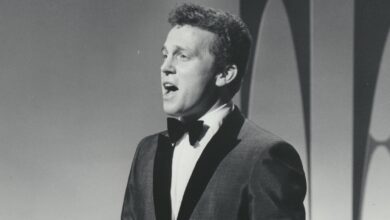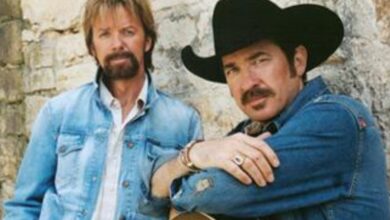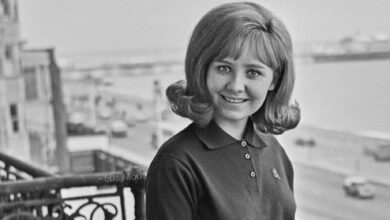Daniel O’Donnell’s “Danny Boy” Rekindles Celtic Sentimentality for a New Generation
When Daniel O’Donnell recorded “Danny Boy” in the mid-1980s, he wasn’t just reviving a classic Irish ballad—he was reintroducing an entire culture’s heartbeat to a global audience. Though the song itself dates back to the early 20th century, O’Donnell’s rendition became a defining moment in his burgeoning career and served as a bridge between traditional Irish music and a wider international fan base. His warm, understated delivery and the clean, reverent arrangement helped “Danny Boy” resonate beyond its usual folk circle and established it as a sentimental anthem among Irish communities worldwide.
Daniel O’Donnell, born in County Donegal in 1961, was raised amid the sweeping landscapes and devout traditions of rural Ireland. His musical upbringing was modest but deeply emotional, rooted in hymns, folk standards, and the heartfelt ballads passed through generations. O’Donnell’s gentle demeanor and respectful treatment of classic material would eventually become his signature, endearing him to audiences not just in Ireland, but also in the UK, the United States, and among the Irish diaspora. From his early performances with his sister Margo’s band to launching his own solo career in the early 1980s, O’Donnell stood out not for flashy showmanship but for his sincerity and connection with audiences.
The decision to record “Danny Boy” was both inevitable and bold. The ballad—written by English songwriter Frederic Weatherly in 1913 and set to the Irish tune “Londonderry Air”—is one of the most iconic and emotionally charged songs in the English-speaking world. While countless artists had recorded it before, O’Donnell approached it not with vocal acrobatics, but with restraint and reverence. His version was recorded during the sessions for his early albums, when he was still gaining traction in Ireland and the UK. The choice reflected his roots, as well as his belief that timeless songs deserved new life in a contemporary setting.
The recording featured minimal orchestration—primarily piano, subtle strings, and O’Donnell’s warm, expressive tenor. The sparse arrangement allowed the emotion of the lyrics to come through unfiltered. Rather than modernizing the track with elaborate production or studio effects, O’Donnell leaned into its traditional form. His breath control and phrasing gave the piece a delicate, prayer-like quality, evoking both longing and spiritual hope. Producer John Ryan, who worked with O’Donnell on several early projects, emphasized clarity and warmth, ensuring that nothing distracted from the storytelling at the song’s heart.
Upon its release, O’Donnell’s rendition of “Danny Boy” quickly became a fan favorite at concerts and on his albums. Though not originally a chart-topping single, its popularity surged through word-of-mouth and his growing television appearances, especially on BBC and Irish national broadcasts. It received significant airplay on both Irish and British radio and remained a recurring highlight of his live performances. The track helped solidify his reputation as a custodian of traditional values in music and connected with older listeners in particular, many of whom had grown up with the song as a lullaby or farewell hymn.
Culturally, the song became a touchstone of O’Donnell’s image: that of the wholesome, humble Irish gentleman. In a pop landscape increasingly defined by glitz, cynicism, or rebellion, his reverent handling of “Danny Boy” felt like a tonic. The song’s presence in his discography offered a clear identity for O’Donnell as a folk-pop balladeer who honored his heritage without exploiting it. For many fans, especially Irish expatriates, it brought comfort and nostalgia, providing a spiritual connection to home through music.
The success of “Danny Boy” marked a turning point in O’Donnell’s career. It positioned him as more than a regional act and opened doors to larger venues and international tours, particularly in the United States where Irish-American communities warmly embraced him. His reputation as a performer who could bring people to tears with a single song grew, and “Danny Boy” became his unofficial calling card—often performed at the climax of concerts, bringing audiences to standing ovations.
The influence of his version also rippled through the broader Celtic and folk music scenes. Other emerging Irish artists began to follow his example by revisiting traditional songs with subtle, polished arrangements rather than overhauling them for commercial appeal. His respectful approach helped elevate the genre’s integrity at a time when folk traditions risked being diluted by pop trends. Though he did not invent this practice, O’Donnell made it commercially viable on a large scale.
Over the years, “Danny Boy” has been covered by legends like Elvis Presley, Johnny Cash, and Judy Garland, yet Daniel O’Donnell’s version stands apart for its intimacy. While others brought grandeur or operatic depth, O’Donnell brought the quiet ache of everyday partings and losses. His take became a staple at funerals, weddings, and national remembrance ceremonies, echoing through halls and hearts alike.
Around the time of the song’s growing prominence, O’Donnell also endured personal highs and lows. He began managing the pressures of fame with his devout Catholic faith, often attributing his grounded nature and career endurance to spiritual discipline. Unlike many artists, he embraced his role as a symbol of peace and comfort—especially in politically tense times between Northern Ireland and the Republic.
Even today, “Danny Boy” remains one of the most requested songs in O’Donnell’s repertoire. It continues to appear on compilation albums, television specials, and fan-curated playlists, especially around St. Patrick’s Day and memorial events. The song has become inseparable from his name, and its longevity underscores the power of simplicity and heartfelt delivery in an age of musical spectacle.
In retrospect, O’Donnell’s “Danny Boy” helped shape the direction of modern Irish folk-pop by reaffirming the enduring value of tradition. It didn’t rely on innovation to be impactful; rather, it reminded listeners that sincerity and emotional truth need no embellishment. His treatment of the song also influenced younger artists to treat their heritage with similar dignity and depth.
Though Daniel O’Donnell has received numerous accolades throughout his career—including honorary doctorates and national music awards—perhaps no recognition matches the legacy of having brought one of the world’s most beloved ballads into countless living rooms and concert halls in a way that felt as intimate as a whispered farewell. “Danny Boy,” in his hands, became not just a song, but a shared moment of emotional clarity across generations.
More than thirty years after his quiet interpretation of this timeless standard, the song continues to serve as a thread that connects hearts to heritage. For Daniel O’Donnell, it was never about reinventing the wheel—but about rolling it gently across time so that others could feel its weight and grace for years to come.



